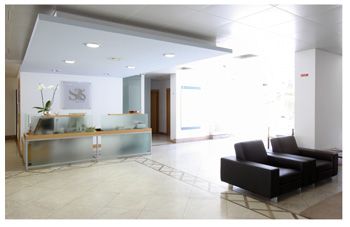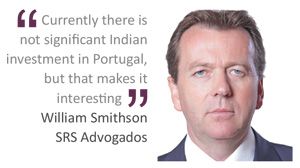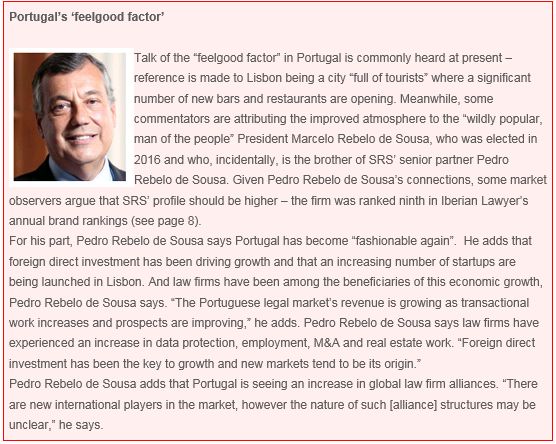 Cross-border M&A is
driving growth at SRS Advogados; with a view to building on this
success, the firm opened a Singapore office to encourage more Asian
investment in Portugal
Cross-border M&A is
driving growth at SRS Advogados; with a view to building on this
success, the firm opened a Singapore office to encourage more Asian
investment in Portugal
SRS Advogados is benefiting from what head of finance William
Smithson describes as a "feelgood factor" in Portugal.
"The market is buoyant, the economy is doing well, there's
a feeling of optimism and the country is perceived as a strong
option for foreign direct investment," he says.
"Portugal's economic stability is making the country
increasingly attractive for investors."
There is also a sense of well-being at SRS at the moment. Recent
work for the firm has included advising Laboratory Corporation of
America (LabCorp) on the Portuguese law aspects of its $1.2 billion
takeover of contract research organisation Chiltern International.
The firm describes the last year as its "best yet"
– though the firm has not disclosed its revenue, a source
says it increased by 10 to 15 per cent in the last year.
Cross-border M&A has been a key driver of growth at the firm,
according to Smithson. "With regard to M&A, we're
advising high-net-worth individuals, private equity funds and
family offices – foreign direct investment is coming
in," he adds. "Tourism, hotels and leisure is also
growing, while there are also good returns for investors in the
commercial real estate market." Smithson says there is
considerable interest in Portuguese assets among pension funds,
particularly those from the UK and Germany. "There is also a
lot of investment in technology in Portugal, particularly companies
from the US and Israel – we've done many technology deals
in the last couple of years," he adds. In one such deal, SRS
recently advised Portuguese venture capital fund Pathena on its
€1.3 million investment in Primetag, a technology startup
specialised in online influence marketing. In addition, Smithson
says there is a lot of investment in fintech, medtech and
security-related technology companies in Portugal. 
Brexit benefits
Uncertainty related to Brexit is working to Portugal's
advantage, according to Smithson. "Lisbon is now an option in
the context of Brexit," he argues. "For start-ups, the
top locations are London, Berlin and Lisbon – such companies
have to ask themselves whether they want to be in London as it is
unclear what Brexit will actually mean, and Portugal is an
attractive option, not only for its great quality of life, but also
it's good infrastructure, competitive services, great
penetration of English and sophisticated and innovative human
resources."
SRS no longer has the international network it had when it was part
of Simmons & Simmons, but in January 2017, SRS opened an office
in Singapore. This move has provided further evidence of how the
UK's loss could be Portugal's gain when it comes to the
repercussions of Brexit. "Through our Singapore office
we're talking to significant players from the region –
traditionally, they would have gone to the UK, but now Portugal is
very attractive to them," says Smithson. "There are
investors from Asia who say they have no visibility in Portugal, so
part of what we do is creating awareness of opportunities
here," he adds. The benefits of having an office in Singapore
is that the city serves as a "platform for the whole Asian
region including Australia and India", Smithson says. Indeed,
SRS sees potential in the Indian market. "Currently, there is
not significant Indian investment in Portugal, but that's what
makes it interesting as there is enormous potential," says
Smithson. He adds that work for international investors is one of
the biggest growth areas for the firm.
Though Smithson does not confirm details, it is understood that
international clients currently contribute around 50 per cent of
SRS' revenue. This is unsurprising given that, generally
speaking, Portuguese law firms get paid higher fees by
international clients than by those in the domestic market. Indeed,
some Portuguese lawyers often lament the fact that they are among
the cheapest in Europe.
What distinguishes SRS is the fact that it is more commercially
focused than some of its competitors, according to Smithson. To
further emphasize the firm's credentials for being
client-oriented, Smithson highlights the fact that the firm's
senior partner Pedro Rebelo de Sousa was formerly a banker and has
"vast international investment bank experience". Smithson
continues: "In addition, in our corporate finance team, we
have people who have worked in investment banks in Hong Kong,
London, Madrid, New York, São Paulo and Singapore –
they have worked on the other side." Smithson adds that what
clients really want is simple, clear, business-focused advice. 
Retaining lawyers and ensuring they perceive SRS as a law firm
offering "good career opportunities, career progression and
excellent training is a key challenge, according to Smithson. He
argues that SRS has been particularly successful in this respect,
"especially given that of the firm's 21 partners, 11 were
trainees at SRS". Smithson also points out that one third of
the firm's partners, and around 50 per cent of the firm's
110 lawyers, are women. "With such a large proportion of women
lawyers, you have to be sensitive to that dynamic and consider
issues such as working from home and childcare, for example,"
he explains. Smithson argues that one of the perks SRS is able to
offer potential new recruits is a healthy working environment.
"This is a good place to work, the work is sophisticated and
innovative, the firm is not too traditional and it has a very good
work-life balance."

The content of this article is intended to provide a general guide to the subject matter. Specialist advice should be sought about your specific circumstances.
